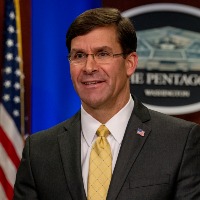
Distinguished Chair
Dr. Mark T. Esper became the twenty-seventh secretary of defense in July 2019 when he was confirmed 90–8 by the US Senate. As defense secretary, Esper was responsible for ensuring the United States’ national security, protecting the American people at home and abroad, and advancing the country’s interests globally. In this capacity, he led one of the largest, most complex organizations in the world given its nearly three million servicemembers and defense civilians, $740 billion annual budget, and trillions of dollars of weapons, equipment, and infrastructure located at 4,800 sites in over 160 countries. Esper’s broad scope of responsibilities ranged from organizing, manning, training, and equipping the joint force to the research and development of future weapons, concepts, and equipment; and from defense trade, diplomacy, and cybersecurity to healthcare, hospitals, housing, and schools. During his tenure, Esper developed key relationships with senior officials throughout the executive branch, members of Congress, major business and philanthropic leaders, and a wide range of international partners.
As secretary of defense, Dr. Esper made major strides in shaping and implementing the National Defense Strategy, which called for a return to preparing for high-intensity conflict in a new era of great power competition. Esper established the Space Force and Space Command, proposed a dramatic change in the size and composition of the US Navy, enhanced the resourcing and operations of Cyber Command, and led a major reform effort that reorganized the department and freed up billions of dollars for higher priorities. He worked hard to strengthen alliances and grow new partners, especially in the Indo-Pacific, and helped drive a major increase in the readiness of NATO members, all while advancing new warfighting, operational, and readiness concepts in the US military.
Esper oversaw the largest R&D budget in the department’s history, drove spending on cutting-edge technologies such as AI, directed energy, advanced networking, robotics, and hypersonics, and launched the biggest initiative in decades to improve diversity and inclusion in the armed forces. Finally, Dr. Esper successfully led the department through one of the most challenging times in the nation’s history: from conflict with Iran, an ongoing military campaign in Afghanistan, and counterterrorist operations in the Middle East to open competition with China and Russia amid a fundamental shift in the weapons and character of war; and from the greatest civil unrest and political turmoil America has seen in decades to the spread of a global pandemic the world hasn’t experienced in over one hundred years.
Prior to becoming defense secretary, Dr. Esper served as the twenty-third secretary of the Army from November 2017 through June 2019. In this capacity, he was responsible for over 1.5 million active, Guard, and reserve soldiers and Army civilians, a budget of $180 billion annually, and all aspects of leading the world’s most capable ground combat force. During his tenure, Esper launched a renaissance in how the service organized, manned, trained, and equipped the force as it shifted its focus back toward large-scale combat operations against great power competitors. Dr. Esper was a reformer who spearheaded an extensive review process that reduced organizational inefficiencies and eliminated scores of programs to free up funding for critical modernization initiatives. He also established a new US Army Futures Command designed to improve the Army’s acquisition process and bolster its broader effort to field a modernized force capable of fighting in all domains. Finally, he directed an overhaul of Army recruiting standards and processes, the lengthening and toughening of infantry basic combat training, and the development of a new talent management system for the service, all while advancing important initiatives for Army spouses and families.
Dr. Esper graduated from West Point with distinction in 1986 and received his commission in the infantry. During ten years on active duty, he served in the 101st Airborne Division and participated in the Gulf War with the “Screaming Eagles,” and later commanded an airborne rifle company in Europe. He then served another eleven years in the National Guard and Army Reserve. From 1996 to 1998, Dr. Esper was chief of staff at The Heritage Foundation, and later served in senior staff positions for the Senate Foreign Relations Committee, Senate Government Affairs Committee, and House Armed Services Committee. Esper was deputy assistant secretary of defense for negotiations policy from 2002 to 2004 and national security advisor for Senate Majority Leader Bill Frist from 2004 to 2006.
From 2006 to 2007, Dr. Esper was the chief operating officer and executive vice president of defense and international affairs at the Aerospace Industries Association. He then worked as the national policy director on the 2008 presidential campaign of Senator Fred Thompson and as a Senate-appointed commissioner on the US-China Economic and Security Review Commission. From 2008 to 2010, he served concurrently as the executive vice president for the US Chamber of Commerce’s Global Intellectual Property Center and as vice president for Europe and Eurasian Affairs. He was vice president for government relations at the Raytheon Company from 2010 to 2017. And from 2006 to 2010 he was an associate professor at the Missouri State University graduate studies program in northern Virginia.
Esper holds a bachelor of science degree from the United States Military Academy, a master of public administration degree from the Harvard Kennedy School of Government, and a doctorate in public policy from George Washington University. He is a two-time recipient of the Department of Defense Medal for Distinguished Public Service, and received numerous awards during his military career, including the Bronze Star, Legion of Merit, and the Combat Infantryman’s Badge.
Dr. Esper is a member of the Council on Foreign Relations, the Veterans of Foreign Wars, and the American Legion. He and his wife, Leah, have been married since 1989 and have three adult children.
